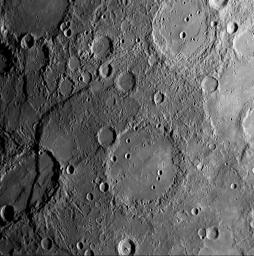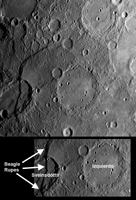
|
Mercury’s Izquierdo: An Impact Basin Newly Named for the Mexican Painter
- Click the image above for a larger view
- Full-Res JPEG (1018 x 1025) (224.6 kB)
- Full-Res TIFF (1018 x 1025) (1.0 MB)
Caption:

Click on the image for larger version
Located to the east of Beagle Rupes and Sveinsdóttir crater , a modest-sized impact basin on Mercury now bears the name of Izquierdo. It was named in July 2009 in honor of the 20th-century Mexican painter María Izquierdo. As seen in this NAC image, the floor of Izquierdo is smooth, the result of having been partially filled with volcanic lava. Circular outlines of the rims of "ghost craters" -- smaller, older craters that have been largely buried by the lavas that infilled the basin -- are visible in a few places on Izquierdo's floor. The remnants of a buried inner ring are also barely discernible in spots, reminiscent of the image of Munkácsy released last week. There have been more recent impacts into the floor of Izquierdo, resulting in some small, sharply defined crater.
Date Acquired:
January 14, 2008
Image Mission Elapsed Time (MET):
108828411
Instrument:
Narrow Angle Camera (NAC) of the Mercury Dual Imaging System (MDIS)
Resolution:
500 meters/pixel (0.31 miles/pixel)
Scale:
Izquierdo is 170 kilometers (106 miles) in diameter
Spacecraft Altitude:
19,400 kilometers (12,000 miles)
Background Info:
These images are from MESSENGER, a NASA Discovery mission to conduct the first orbital study of the innermost planet, Mercury. For information regarding the use of images, see the MESSENGER image use policy .
Cataloging Keywords:
| Name | Value | Additional Values |
|---|---|---|
| Target | Mercury | |
| System | ||
| Target Type | Planet | |
| Mission | MESSENGER | |
| Instrument Host | MESSENGER | |
| Host Type | Orbiter | |
| Instrument | Mercury Dual Imaging System (MDIS) | |
| Detector | Narrow Angle Camera (NAC) | |
| Extra Keywords | Crater, Grayscale, Impact, Volcano | |
| Acquisition Date | ||
| Release Date | 2009-09-01 | |
| Date in Caption | 2008-01-14 | |
| Image Credit | NASA/Johns Hopkins University Applied Physics Laboratory/Carnegie Institution of Washington | |
| Source | photojournal.jpl.nasa.gov/catalog/PIA11959 | |
| Identifier | PIA11959 | |
